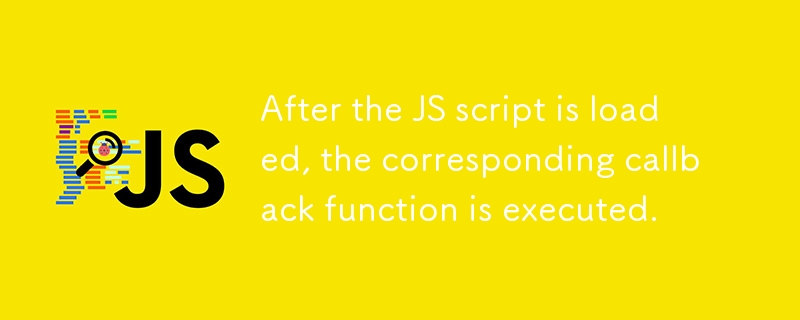Abstract : This article explores various methods for executing callback functions after JavaScript scripts have loaded. It discusses the "onload" event listener as a common approach, then presents alternative techniques such as document.rea

How can I trigger a specific callback function when a JavaScript script finishes loading?
JavaScript provides several ways to execute a callback function after a script has loaded successfully. One common method is through the "onload" event listener:
<script type="text/javascript" src="my_script.js" onload="callbackFunction()"></script>
Copy after login
This script tag includes an "onload" attribute that specifies the "callbackFunction" to be invoked once the "my_script.js" script has finished loading.
What are different methods for executing a callback function after a JS script has been loaded?
Besides the "onload" event listener, here are some alternative methods for initiating callback functions after JavaScript script loading:
-
Document.readyState: This DOM property can be used to track the loading state of the document, including the embedded scripts. Once the "readyState" becomes "complete," it indicates that all the scripts have been loaded.
-
MutationObserver: MutationObserver provides a mechanism to observe changes in the DOM. By observing the "document" or specific elements within it, you can monitor script loading status and trigger callbacks accordingly.
-
Async and Await: ES6 introduced the "async" and "await" keywords, which allow for asynchronous script loading and sequencing. With this approach, you can await the loading of a script before executing the callback function.
How can I ensure that a callback function runs only after a JavaScript script has fully loaded?
To guarantee that a callback function is executed only after a JavaScript script has fully loaded, consider employing these techniques:
-
Deferred Callback: This involves defining a callback function that is stored and called only when the script has loaded and executed. The callback is often stored in a global variable or a closure.
-
Promise: Promises provide a means to handle asynchronous operations, including script loading. By using Promises, you can create a callback function that executes once the script has fulfilled the Promise.
-
Event Bubbling: When using event-based callback methods (e.g., "onload"), ensure that the event bubbling mechanism is properly utilized to capture the event only after the script has fully loaded. This can be achieved by adding event listeners to the document element or other appropriate parents.
The above is the detailed content of After the JS script is loaded, the corresponding callback function is executed.. For more information, please follow other related articles on the PHP Chinese website!






